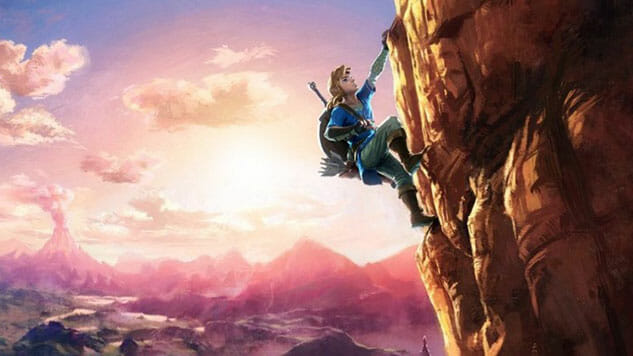Breath of the Wild Has Pretty Much Ruined Me For Exploration Games
Games Features The Legend of Zelda: Breath of the Wild
“I just tried to make Aloy long jump across a river,” I told my Twitter followers earlier this week. Signs, I said, that I’d been playing too many different games all at once recently. I’d not only tried to use Super Mario Odyssey moves in Horizon Zero Dawn: The Frozen Wilds, I’d also repeatedly hit the lower arrow button on my Dualshocker, forgetting that it was Wolfenstein II that uses a hint navigation system. “Ugh”, said one friend, “That would make the game so much better.” “That’s ok,” offered another, “I keep getting mad that she can’t climb up walls, because of the new Assassin’s Creed.” If there’s anything videogame players can universally understand, it’s the frustration that comes from trying to memorize and easily switch between several control schemes and instinctive gaming reflexes all at once.
But more than that, sometimes a game should just have a feature it doesn’t, one you loved and adapted to quickly in another game that just made everything more fun. And the desire to use that mechanism or system, whatever it may be, haunts like a ghost, tapping into the little reflexes your brain has programmed around certain puzzles or obstacles, reminding you of your contextual limitations and making the progression frustrating. And as I continue to 100% Horizon Zero Dawn, working my way through the final little errands and missions in The Frozen Wilds, the thought comes up time and time again: The Legend of Zelda: Breath of the Wild has just about ruined me for all other exploration games.
It’s not the first game to have this effect on me. Dying Light was a similar experience. Like Breath of the Wild, it too has a major feature that should be established as a genre convention: parkour. As a natural, almost predictable escalation of the evasive gameplay mechanics of other zombie games, it just made sense.
Breath of the Wild meanwhile has made playing Horizon Zero Dawn (the base game, which I got to late, due to being busy with Breath of the Wild) slightly disappointing. The inability to climb up walls almost ruined the whole experience. Despite the many heroes before her to do so, somehow it seems so sad that Aloy is reduced to clinging to bright rails and painted handholds, many often inexplicably no more or less stable than the jagged formations around her. Sure, the slick little animations as she hops over boulders and other small obstacles are cool, but you’d think someone with her survivalist upbringing, amazing outdoors skill set and well toned power muscles would be able to climb rocks a little better. What kind of super killing machine walks around a foothill? And what kind of post apocalyptic landscape would still have clearly marked grapple mounts?
If you think about it, the rock climbing mechanism makes as much sense for exploration games as parkour did for the zombie ones. As exploration games become as much about enjoying an atmosphere as they are about sandbox mischief, the ways we explore those environments will continue to expand. If the game is about the environment, and thus the land, itself, rock climbing is a natural progression for the genre, like swimming or paragliding. It’s about ways to navigate and move at the player’s preferred pace in a scenic setting.
I suspect the legacy of Breath of the Wild will last for many years. Not just in games development itself, but in the aggrieved and labored sighs of every gamer who wishes they could just climb over that stinkin’ rock wall instead of taking the long way around. Personally I’m looking forward to more stamina wheels, white knuckles, and power grunts in the future.
Holly Green is the assistant editor of Paste Games and a reporter and semiprofessional photographer. She is also the author of Fry Scores: An Unofficial Guide To Video Game Grub. You can find her work at Gamasutra, Polygon, Unwinnable, and other videogame news publications.